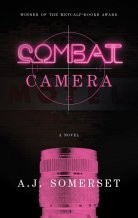Combat Camera
What is war photography? Is it a relatively modern art form with visual images creating a story, or a cheap thrill for a society that is fascinated with violence and struggles for power?
Now replace “war photography” with “pornography,” and you end up exploring the kind of unhappy, uncomfortable juxtapositions that A. J. Somerset explores in his Metcalf-Rooke award-winning novel Combat Camera.
Lucas Zane, the novel’s central figure, was born of a conversation Somerset – a former soldier and freelance photographer – had with a friend. “What if (a war photographer) woke up one morning, looked back, and thought, well, that was a complete waste of time and energy?” he wondered.
Zane is an acclaimed 40-something photographer who, hitting his breaking point after decades of recording the worst things people do to one another, is now left in his crappy Toronto apartment keeping afloat as a cheap pornographic photographer in an attempt to escape from the memories of all those years.
On the set he meets Melissa, a young woman as eager to escape her past as he is. After some incorrigible differences at work, the two embark on a journey to Vancouver, trying to reclaim their lives from the violence that seems to surround them.
The novel is written in such a way that we can understand Zane’s “frangible reality.” Even removed from the warzone, he’s left standing shaking in the supermarket with the jagged shells of a tray of dropped eggs turning to broken skulls and pooling blood on the floor before his eyes.
The passages wherein the past slides over the present are Somerset’s most powerful, as the gasps of one of the porn girls flashes to the bubbling breath of the victim of a sniper shot and back again in the same paragraph.
He also draws readers in with a hypnotic narrative of shutter speeds and low-dispersion glass, turning outdated techniques into a reverent tribute to the art of photography.
Rather than being unnecessary expressions of the author’s proficiency in the field, these processes add delicateness to a journey wherein Zane tries to turn “light into silver” through the lens of his ever-present camera.
Combat Camera leaves us without answering any of the questions it poses about our reactions to the violence represented.
It may, however, leave you wondering if you should feel a bit dirty the next time you flip through National Geographic.
Published in Volume 65, Number 12 of The Uniter (November 18, 2010)







